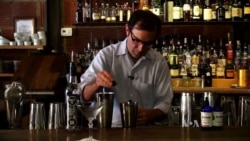Kentucky might be known for its bourbon, but whiskey was made all over the U.S. in thousands of small-scale distilleries in the years before Prohibition made it illegal to make or consume alcohol.
Nearly 80 years later, New York loosened its laws and encouraged craft distilling through business incentives.
Now local distillers have set up shop in New York City creating innovative spirits with locally farmed ingredients.
Every cocktail, says Allen Katz, co-founder of New York Distilling Company in Brooklyn, starts with a great spirit, like the gin and rye whiskey he distills on site.
"Finally, 80 years post-prohibition, we are reclaiming our taste buds,” he says.
That’s because New York made it legal for small-scale distillers to not only operate but also to self-distribute and have tasting rooms. New York Distilling Company, which now sells up to 10,000 cases a year, is one of more than 30 state manufacturers.
While craft distillers only account for two percent of total U.S. distilled spirits by volume, their presence is growing. The number of craft distillers has skyrocketed from 250 in 2009 to over 700 today — and small distillers did more than $400 million in revenue last year, according to the Distilled Spirit Council of the U.S.
"It’s absolutely a win for us because it allows us to enter the marketplace at more reasonable cost to set up a business like this from scratch,” says Katz.
New York rye has been used in local liquor for centuries, says Katz's head distiller, Bill Potter, adding that the oldest distillery was actually on Staten Island, dating back to 1640.
Another Brooklyn-based distiller, Breuckelen Distilling Company, Inc., works with local farmers to create a regional flavor. The specialty Farmer’s Distillery License that Bruekelen and others operate under requires at least 71 percent local grains.
“We’ve been working with the same farmer since we started, and we did the first distillation in 2010," says Brad Estabrook, founder of Breuckelen Distilling.
He says small-batch spirits are successful because customers care where their liquor comes from and who makes it. It’s part of a what he calls a backlash against global commercialism.
"When we first started we had the one product, and, yeah, we’ve grown a lot from there," he says. "We’ve shipped product into Europe, into Australia, we’re shipping into Panama in July for the first time.”
Just like the perfect cocktail, growth is all about the right mix — in this case, a blend of financing opportunities, state support, and ingenuity.








